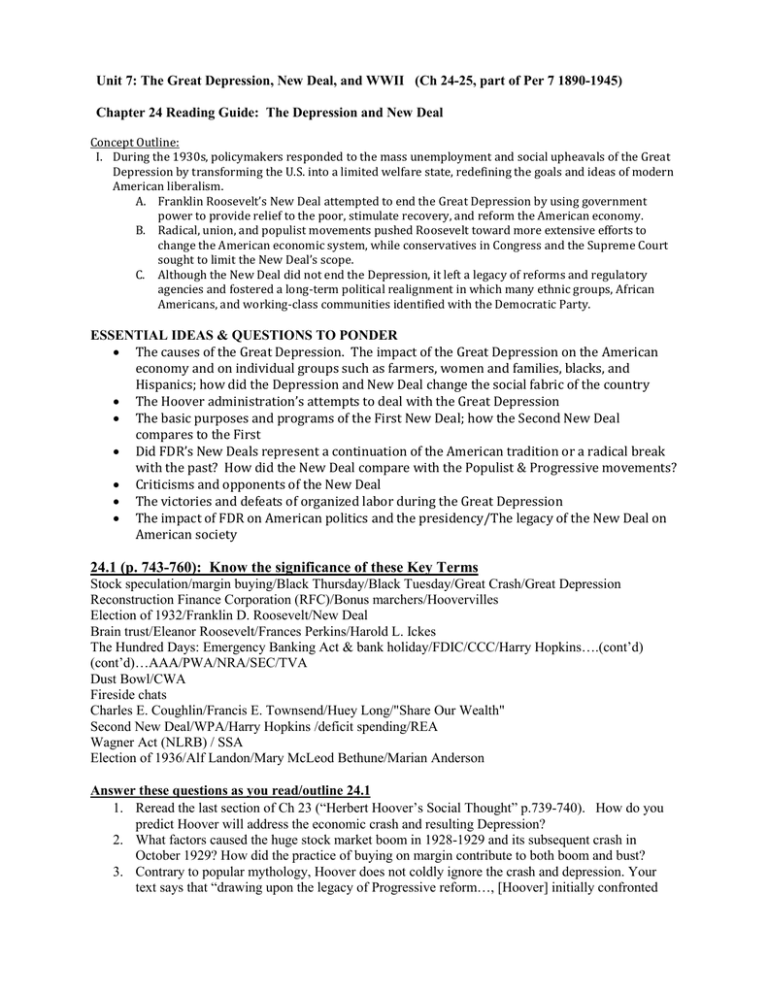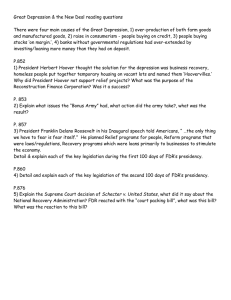Unit 7: The Great Depression, New Deal, and WWII ... Chapter 24 Reading Guide: The Depression and New Deal
advertisement

Unit 7: The Great Depression, New Deal, and WWII (Ch 24-25, part of Per 7 1890-1945) Chapter 24 Reading Guide: The Depression and New Deal Concept Outline: I. During the 1930s, policymakers responded to the mass unemployment and social upheavals of the Great Depression by transforming the U.S. into a limited welfare state, redefining the goals and ideas of modern American liberalism. A. Franklin Roosevelt’s New Deal attempted to end the Great Depression by using government power to provide relief to the poor, stimulate recovery, and reform the American economy. B. Radical, union, and populist movements pushed Roosevelt toward more extensive efforts to change the American economic system, while conservatives in Congress and the Supreme Court sought to limit the New Deal’s scope. C. Although the New Deal did not end the Depression, it left a legacy of reforms and regulatory agencies and fostered a long-term political realignment in which many ethnic groups, African Americans, and working-class communities identified with the Democratic Party. ESSENTIAL IDEAS & QUESTIONS TO PONDER The causes of the Great Depression. The impact of the Great Depression on the American economy and on individual groups such as farmers, women and families, blacks, and Hispanics; how did the Depression and New Deal change the social fabric of the country The Hoover administration’s attempts to deal with the Great Depression The basic purposes and programs of the First New Deal; how the Second New Deal compares to the First Did FDR’s New Deals represent a continuation of the American tradition or a radical break with the past? How did the New Deal compare with the Populist & Progressive movements? Criticisms and opponents of the New Deal The victories and defeats of organized labor during the Great Depression The impact of FDR on American politics and the presidency/The legacy of the New Deal on American society 24.1 (p. 743-760): Know the significance of these Key Terms Stock speculation/margin buying/Black Thursday/Black Tuesday/Great Crash/Great Depression Reconstruction Finance Corporation (RFC)/Bonus marchers/Hoovervilles Election of 1932/Franklin D. Roosevelt/New Deal Brain trust/Eleanor Roosevelt/Frances Perkins/Harold L. Ickes The Hundred Days: Emergency Banking Act & bank holiday/FDIC/CCC/Harry Hopkins….(cont’d) (cont’d)…AAA/PWA/NRA/SEC/TVA Dust Bowl/CWA Fireside chats Charles E. Coughlin/Francis E. Townsend/Huey Long/"Share Our Wealth" Second New Deal/WPA/Harry Hopkins /deficit spending/REA Wagner Act (NLRB) / SSA Election of 1936/Alf Landon/Mary McLeod Bethune/Marian Anderson Answer these questions as you read/outline 24.1 1. Reread the last section of Ch 23 (“Herbert Hoover’s Social Thought” p.739-740). How do you predict Hoover will address the economic crash and resulting Depression? 2. What factors caused the huge stock market boom in 1928-1929 and its subsequent crash in October 1929? How did the practice of buying on margin contribute to both boom and bust? 3. Contrary to popular mythology, Hoover does not coldly ignore the crash and depression. Your text says that “drawing upon the legacy of Progressive reform…, [Hoover] initially confronted 4. 5. 6. 7. 8. 9. 10. 11. 12. 13. the crisis boldly..” (p.747). What did he do? How would you assess President Hoover’s response to the crisis? According to the charts on p. 746, what was the worst year of the Depression? What were some of the impacts of the Depression on Americans? How did they respond? While campaigning in 1932, what did FDR promise? What did he mean by this….did he have a specific plan? What’s the famous line from his inaugural address? What were the major programs of the first “100 days” address? Know the programs listed in the key terms for the 100 days. Were they geared to recovery, relief, or reform? Did FDR’s programs help or hurt farmers? How did his agriculture/farmers policies change over time, and why? (You’ll need to read several sections to answer this…) How did mass media (radio, advertising) play a role in the successes of the New Deal? Do you think any president could have used this tool as effectively as FDR? What were FDR’s major challenges from the right and the left? Know Coughlin, Townsend, Long. How did the “Second New Deal” differ from the first? Why did it change? What was remarkable about the WPA? (successor to the CWA) What is the significance of the Wagner Act? Who was covered under the SSA? Who was not? Read (and re-read) the last paragraph of the Social Security Act section (p.758, 2nd col). What was the impact of the New Deal? 24.2 (p.760-778) Soil Conservation Service/Taylor Grazing Act/Grand Coulee Dam/Indian Reorganization Act Court-packing scheme /the “Roosevelt” recession FSA/Housing Act/Fair Labor Standards Act Hatch Act John L. Lewis/CIO and Walter Reuther/UAW Scottsboro Boys/repatriados Warner Brothers/Frank Capra/Marx Brothers/Gone with the Wind/Shirley Temple John Steinbeck/James Agee/Aaron Copland/Benny Goodman/Zora Neale Hurston 1939 New York World's Fair /War of the Worlds broadcast Answer these questions as you read/outline 24.2 1. 2. 3. 4. 5. 6. 7. 8. 9. 10. How and why did Roosevelt want to "pack" the Supreme Court? How did that work out for him? What caused the “Roosevelt Recession” in 1937? What ended it? What conclusions do you draw from this? Your text states that “late New Deal measures set important precedents for the future.” To which programs is the author referring, and why do you think he makes that argument? Would you classify these programs as Recovery, Relief, or Reform? Do you think the New Deal was successful? Why or why not? What was the psychological and social impact of the Great Depression? How did the Great Depression and New Deal effect women? Minorities? Analyze the graph on p. 766. What continuities and changes occur for labor during the Depression and New Deal? Know the CIO, the sit-down strike that leads to the UAW. Who gets left out of the union movement? How were the radio and movies of the time seen as an escape from the Great Depression? FDR said, “While it isn’t written in the constitution, nevertheless it is the inherent duty of the Federal Government to keep its citizens from starvation.” Do you agree? Why or why not? Take another look at the Essential Ideas and Questions to Ponder on p.1 of the reading guide. Could you confidently write an essay or SAQ on these topics?

